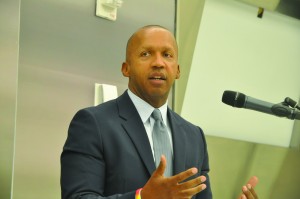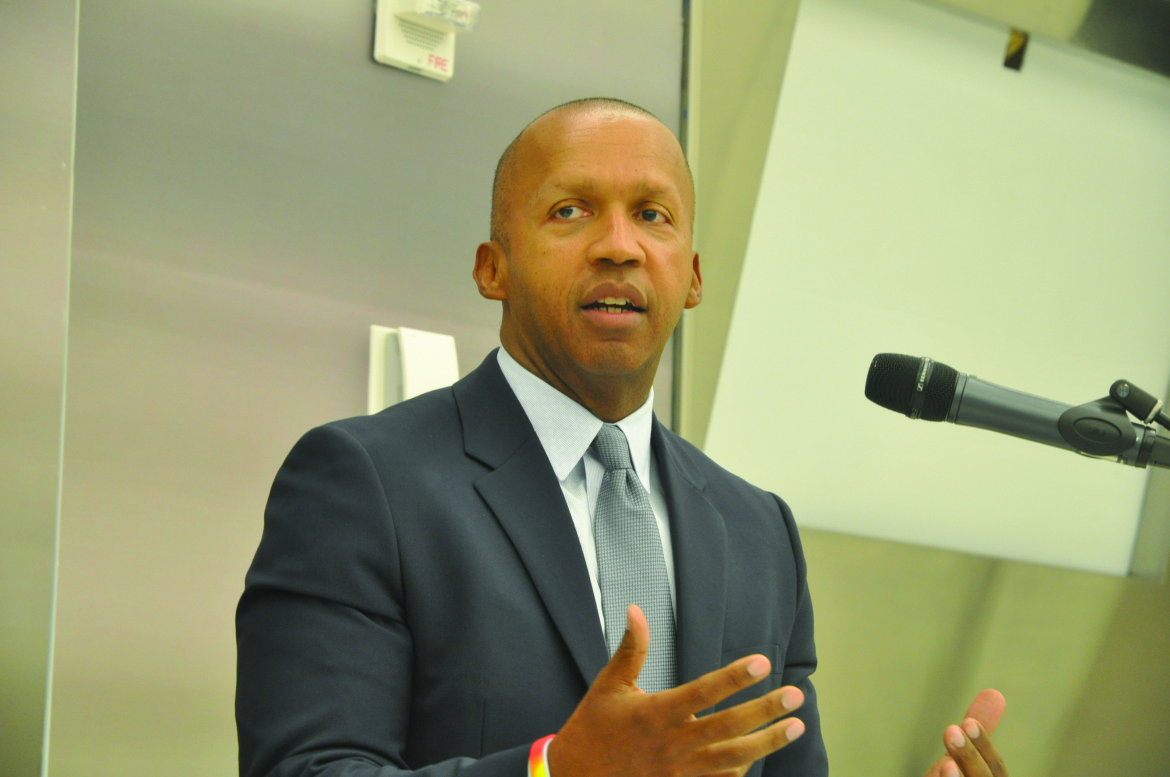 Bryan Stevenson didn’t want to go to TED, the genre-defying annual conference full of big thinkers and big ideas. He brushed it off, claimed he was too busy and, besides, he didn’t know anything about it. He was preparing for a big case that was just days away – one that could result in a total ban on juveniles being sentenced to life without parole.
Bryan Stevenson didn’t want to go to TED, the genre-defying annual conference full of big thinkers and big ideas. He brushed it off, claimed he was too busy and, besides, he didn’t know anything about it. He was preparing for a big case that was just days away – one that could result in a total ban on juveniles being sentenced to life without parole.
Winning the case is a cornerstone goal of a litigation campaign by Equal Justice Initiative (EJI), the Alabama nonprofit Stevenson founded to fight discrimination and injustice in the legal system.
“Well, I have to say I wasn’t really interested in going,” Stevenson said in a recent interview. “It was March, and I was so busy preparing for the Supreme Court case and frankly I didn’t know what [TED] was.”
Stevenson’s staff, however, knew exactly what TED was and understood how important it could be in raising awareness of just the kind of issues Stevenson has been working on most of his career. They insisted he go. He got on a plane and flew to California.
“And I’m so glad I did,” he said. “It was a great experience. There is so much energy around it. I was really astonished by that.”
Founded in 1984, the four-day TED conference, short for Technology, Entertainment and Design, annually attracts 1,500 diverse audience members to Long Beach, Calif. to listen to big names and top innovators who are challenged to “give the talk of their life” in 18 minutes or less. The results are often powerful monologues that receive hundreds of thousands of views online.
TED’s slogan is “Ideas Worth Spreading,” and the conference prides itself on unearthing creative new concepts and putting them in front of a generous community of forward-thinking individuals eager to pitch in. If presented honestly and with passion, the TED community will rally around the cause, donating money, resources and whatever is necessary to help it succeed. The real stars at TED are the unknown speakers who blast out of nowhere to surprise the audience with inspiring talks about thought-provoking ideas, important issues and ground-breaking advances in science and technology – their talks often enhanced by rich data and creative PowerPoint presentations.
“[I]t was intimidating,” Stevenson said. “There were so many speakers who had charts and slide shows and that’s just not my style.”
“I didn’t prepare any differently than I normally do,” he said. “I knew the material, of course, but I didn’t do anything differently. I worried about being so naked in my presentation….”
On that day in early March, Stevenson, alone at the front of the dark stage, drove home the point that children should not be in adult prisons, they should not be tried as adults and they should never be sentenced to die in prison. He told deeply personal stories of his rural Alabama childhood and his inspiring relationship with his teetotaler grandmother, the daughter of slaves. He spoke about race, poverty and a justice system he says provides little justice for the poor – and even less for children.
“The opposite of poverty is not wealth,” he said. “The opposite of poverty is justice.”
Throughout, Stevenson never moved more than a few paces on the stage’s round, red carpet and his voice remained soft, clear and calm, creating a beautiful, still place from which to speak about ugly, uncomfortable truths. It was a guided meditation through the United States’ troubled history with race, class, poverty and justice and the audience responded with rapt attention.
“We need to find ways to embrace these challenges, these problems, the suffering,” Stevenson said, “because ultimately, our humanity depends on everyone’s humanity.”
As an attorney, Stevenson often represents kids charged with serious crimes such as murder or armed robbery, and sometimes a judge orders the child be tried as an adult. Stevenson recounted a late night contemplating how this could be so, a smile playing on his lips as he described writing a tongue-in-cheek brief about his conclusion.
“How can a judge turn you into something you’re not? [He] must have magic power.”
Stevenson spoke about his work at EJI and the upcoming cases before the Supreme Court involving two juveniles tried as adults and sentenced to die in prison via life without parole.
He left the TED crowd with a final thought, a quote from Theodor Parker, a 19th Century Unitarian minister, that was made famous by Dr. Martin Luther King Jr.
“The moral arc of the universe is long,” he said, “but it bends toward justice.”
And then, while Stevenson stood alone in the stage spotlight looking slightly embarrassed, the audience got to its feet and applauded. And they kept applauding, delivering what TED Curator Chris Anderson said was the longest and loudest standing ovation in TED history.
When the applause eventually died out, Anderson, whose nonprofit organizes TED, took the stage to speak with Stevenson. Audience members wanted to know how they could help and Anderson asked what Stevenson’s funding needs were.
“We are trying to raise $1.5 million for a campaign that ends excessive sentencing of children and stops the practice of putting kids in adult jails and prisons, where they are 10 times more likely than other incarcerated people to be the victims of sexual assault and violence,” Stevenson replied. “We just started this effort, and support from the TED community could be huge.”
According to a blog posted by Anderson the day after Stevenson’s talk, Anderson invited the audience to contribute to Stevenson’s effort. Within moments conference attendees pledged nearly $1 million in support. TED is known as a generous community, but the response to Stevenson’s cause was unprecedented. After the addition of a $100,000 contribution from TED itself, Anderson says he cut Stevenson’s organization a check for $1.12 million.
But Stevenson, speaking later about his TED experience, pushed aside the question of money.
Yes, he said, it resulted in some money being raised but, “it wasn’t so much about the money; it was about the moment. It was a wonderful experience.”
Anderson, however, was not so quick to brush it off.
“It’s truly thrilling to see what happens,” Anderson wrote, “when someone comes to TED and induces a whole new view of the world in our audience – and does so in such a powerful and inspiring way.”
